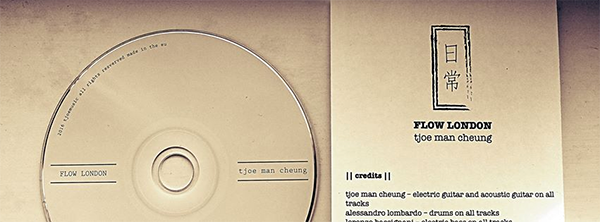
by Ian Mann
February 04, 2016
/ EP
There is much to enjoy about this EP with each carefully crafted composition expressing its own sound-world. There is considerable promise here.
Tjoe Man Cheung
“Flow London”
(Self release)
Tjoe Man Cheung is a young Hong Kong born guitarist, composer, arranger and producer who has been living in London since January 2015. During his year in the capital he has been establishing himself on the city’s jazz scene playing at venues such as Rich Mix in Shoreditch, Map Studio Café in Kentish Town, Stage 3 in Hackney, Pizza Express Jazz Club and the late night jam at Ronnie Scott’s.
The self released “Flow London” is his second EP, a follow up to 2014’s “Flow”, and the majority of the compositions are inspired by his experiences of living in the UK and in London in particular. In its brown paper hand stamped sleeve it is very much in the punk/DIY spirit, even though the music sounds nothing like indie or punk. The flimsy paper insert offers insights as to the inspirations behind the tunes and makes for interesting reading.
The core personnel on “Flow London” is the trio of Cheung on electric and acoustic guitars, Lorenzo Bassignani on electric bass and Alessandro Lombardo at the drums. Guest appearances come from violinist Yi-Ning Liao, trumpeter Bodo Maier, keyboard player Dimitris Dimopoulos and vocalist Emma Hamilton. It’s a truly international line up that neatly embodies the polyglot spirit of 21st century London.
The opening track “Walking In The Rain” adopts a sound influenced by 70s style fusion with solos from Dimopoulos on trilling Fender Rhodes and the leader on warm toned electric guitar. Maier also features on pure toned trumpet and there’s a drum feature for Lombardo shoe-horned in rather incongruously towards the close. The piece is inspired by the fact that Cheung’s move to London has allowed him to wear the rather fashionable raincoat that he bought in Hong Kong but rarely used. One senses that the novelty is beginning to wear off, even more so after this winter!
Maier switches to velvety flugel horn for “The Music Never Stopped”, a title jointly inspired by the film of the same name starring J.K. Simmons and the Grateful Dead song from the album “Blues For Allah”. The mood is relaxed with Cheung exhibiting something of Pat Metheny’s warmth and clarity of tone on his solo. Maier displays an admirable fluency on his flugel solo and the piece also features a liquid electric bass solo from Bassignani.
“N5 To Edgware” is inspired by Cheung’s travails when taking the night bus home to Zone 4 after those late night jams at Ronnie’s. I guess everybody’s got their own “nutter on the night bus” story.
The tune is more relaxed than the title might suggest but there’s an agreeable bustle about Lombardo’s drumming allied to Bassignani’s springy bass grooves that helps to drive the piece forward. Cheung features on electric guitar and shares the limelight with Dimopoulos who displays considerable imagination during the course of his synthesiser solo.
The charming “Four Seasons” expresses Cheung’s delight at the four distinct phases of the British year. It would appear that Hong Kong only experiences summer and winter leading Cheung to observe “The distinct seasons are wonderful to Hong Kong people. I think the changing of seasons is the most beautiful thing I’ve seen in my life. I’m glad to witness it in London.” Perhaps intended as a nod to Vivaldi the tune features the violin of Liao which combines effectively with Cheung’s guitar above a surprisingly muscular, almost funky, bass and drum groove that culminates, more logically and organically this time, in a closing drum feature for Lombardo.
“Miss Someone You Don’t Know” refers to London’s changing street-scape, the way in which a shop that you’ve never actually been in closes down and somehow you miss it. I can confirm from personal experience that it happens in small towns too. The piece is a true ballad with a tangible air of loss and nostalgia. The combination of Cheung’s softly chiming electric guitar and Liao’s violin gives the piece a definite Far Eastern tinge, the first overt reference to Cheung’s heritage. There’s also a delightfully melodic solo from Bassignani on liquid toned electric bass.
The final piece is a ‘bonus track’, a version of the Leo Chauliac/Charles Trenet song “Que Reste T’il De Nos Amours”. It’s performed by the duo of Cheung on acoustic guitar and Emma Hamilton on voice and accordion. Hamilton sings the lyrics in French and it’s a duo performance of considerable skill and charm.
There is much to enjoy about this EP with each carefully crafted composition expressing its own sound-world. OK, it’s a little derivative and some of the more fusion-esque tracks stray a little too close to smooth jazz for comfort, but there is still considerable promise here. Cheung is obviously relishing his time in London and his involvement in the city’s jazz scene, so hopefully he’ll be around in the years to come and his writing and playing will continue to develop.
Cheung doesn’t appear to have his own website and “Flow London” isn’t as yet available on Amazon. If you’d like to purchase a copy of this EP I suggest you either attend one of Tjoe’s gigs or contact him via his Facebook page, which also features some excellent youtube clips of his playing.
http://www.facebook.com/Tjoemusic
P.S.
Cheung’s management tell me that the EP should now be available through Amazon, CDbaby and iTunes.